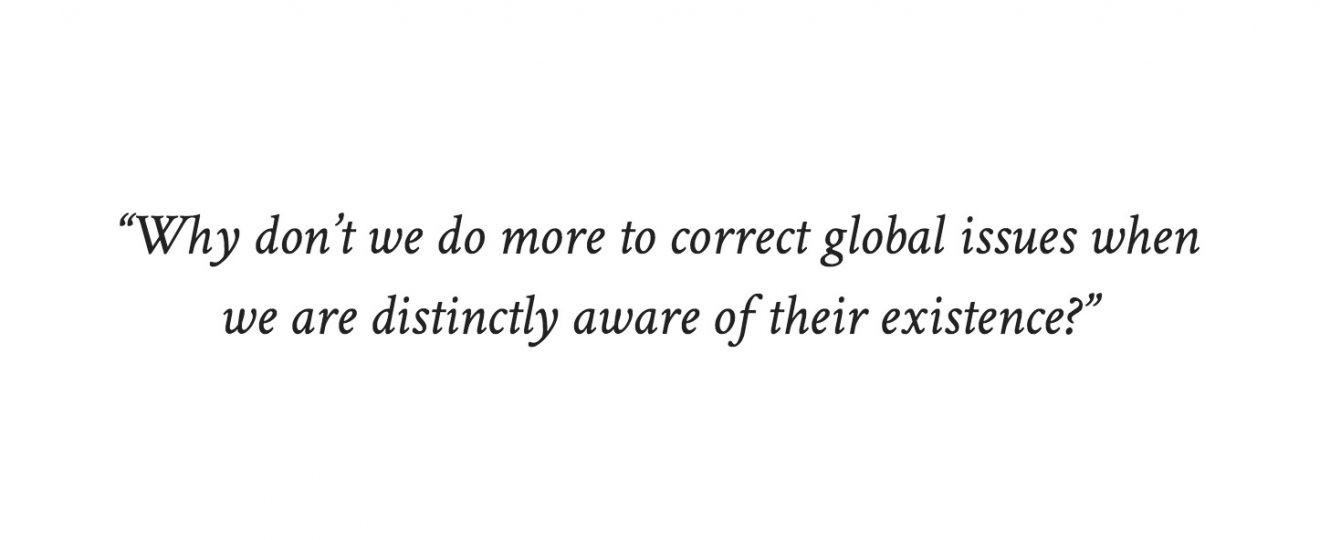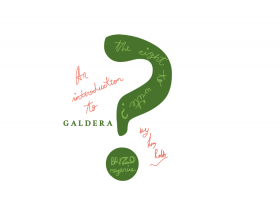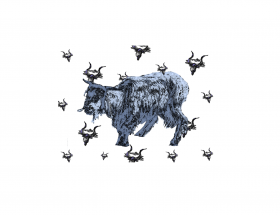What an Italian Marxist from the 20th Century can tell us about 21st-century passivity surrounding contemporary plight.
Despite remaining physically imprisoned for eleven years, the mind of Antonio Gramsci ran free and uninhibited from his prison cell in Turi, Italy. Gramsci, an Italian Marxist politician and philosopher of sociology and political theory, wrote over 30 notebooks during the time of his incarceration. However, the influence of Gramsci’s notebooks is not solely contained to the intellectual spheres of theory and philosophy; his concept of Cultural Hegemony is of undeniable importance in terms of understanding the psychology of the contemporary global citizen. Moreover, an understanding of Cultural Hegemony may provide us with an answer to the question that seems to plague the minds of the 21st century:
Why don’t we do more to correct global issues when we are distinctly aware of their existence?
What is Cultural Hegemony?
Gramsci’s theory of Cultural Hegemony is clearly more complex than can be explained in a mere few sentences. But even an oversimplified version of its core construction is sufficient enough in helping us see many recognisable truths in our current political and ethical climate.
Hegemony, as defined by Gramsci, is the supremacy of a ruling class over a social group that manifests itself through either domination or leadership. In Gramsci’s eyes, this ruling class was embodied by Capitalism, and the social group upon which Capitalism wielded hegemony was the working-class. However, the existence of a hegemonic relationship was made possible not solely through coercion or violence from the hegemon; the party in power creates cultural norms that enact a society-wide acceptance of the class system itself.
Gramsci believed that a hegemon – in order to maintain power within a social system – exerts power ideologically. They do so by creating a hegemonic culture, in which the beliefs, decisions, values, and moral identities of the ruling class become the status quo or something of ‘common sense’. This, therefore, perpetuates the belief that the ruling class makes choices or acts for the interest of the dominated social group.
In turn, we learn of a very basic building block of hegemony: acceptance.
Gramsci argued that people are not oblivious to power and that they both know and accept when power is being exerted upon them. People experience power every day. Through rules and regulations, through cultural norms and widely accepted beliefs. People, however, also suspend their critiques to that power, as its very existence is perpetuated by the belief that it exerts itself and exists intrinsically. At its foundation, hegemony thrives upon an acceptance of the cultivated societal standard. It can exist not because it is unnoticeable – manipulating reality stealthily and in a behind-the-curtain fashion – rather it can exist because it can be seen, and because in an act of individual ambivalence, we accept it as inevitable.
The Ambivalent Global Consumer
Generally, the most common perpetrators of irresponsible and insatiable consumerism are those who are living in and products of particularly privileged bubbles of the world.
This is a fact drenched in its own sour irony, as not only do these people often contain the affluence necessary to purchase more-expensive-yet-more-responsible-goods, they also have (quite frequently) been educated on the benefits of the more informed purchase.
As an individual who grew up in a higher-class Western society, I have seen first-hand the apathy that consistently plagues the people within it when it comes to confronting problems that they have the power to change. When you have been made aware of and taught about both the human and environmental detriments of sweatshop labour and fast fashion, anti-fair trade goods or the negligence of workers rights, international conflict, and crippling poverty, why wouldn’t you make choices to avoid their continuation? When life hands you privilege by mere circumstance, why wouldn’t you utilise it to benefit the world in which you live? Inculpable ignorance or situational necessity leading to perhaps less ‘informed’ purchasing is one thing, but make no mistake: this aforementioned consumer is one who suffers not from a lack of understanding or ability. They have the ability to make influential choices by utilising individual wealth, yet are plagued by some vague indifference over these choices and the consequences of them.
These consequences aren’t immediate or visible to the upper-class Western consumer. They are, however, evident in countries that bear the brunt of consumer greed. They are evident upon Montesinos Beach in the Dominican Republic, where waves of washed up garbage have become the new sand. They are evident in the Bangladeshi sweatshops like the Rana Plaza garment factory, responsible for the killing of more than 1,100 Bangladeshi workers in 2013. They are evident for the near half-million children labouring on farms within the Côte d’Ivoire, producing the majority of the globes cocoa supply for chocolate.
The limp refusal to change consumerist habits even in the face of evident and universally recognized plight (particularly when executed by Western consumers) is a re-enforcement of some innate and subconscious belief in geographical hierarchy. At its ugliest core, it is the drawing of a distinction between the West and ‘the Rest’; reaffirming some idea that suffering on part of the Global South is somehow less important or valid than a Western individuals desire for material goods. Whether or not it be consciously recognized, this belief in itself is a chill-inducing call to some archaic beliefs from the ages of colonialism — a remnant of the ideology that there exists an (innately racialised) geographical hierarchy of importance. That somehow, one place and its citizens matter more than another.
Why is this indifference connected to a geographic hierarchical sentiment? Why does this indifference exist in the first place? Perhaps it is an understanding of Gramsci’s Cultural Hegemony theory that could help us understand. Perhaps it is a living example of suspended critique over hegemony, and the acceptance of enacted norms.
By being educated upon the consequences of irresponsible consumerism, individuals embody Gramsci’s belief that hegemony is not unnoticeable. We are most certainly not oblivious to human plight on a global scale. We see it in news stories, on Facebook timelines, in statistics taught in schools, and yet they largely go ignored. In this complacency, we find some form of acceptance that certain structures of our world exist simply because that’s ‘just the way things are’. Despite containing knowledge that small choices can impact and shift these structures, little is done on part of the consumer.
The hegemonic culture that is being re-enforced here is that of a geographical social stratum existing intrinsically within our world. Consumers who purchase goods that are detrimental to workers, the environment, or countries as a whole, are subscribed to and contributors of that culture itself.
The role of “Hegemon” can be embodied by multiple entities. Whether it be corporations selling and profiting from goods produced with a blind eye and dirtied conscious, governments allowing certain loopholes to exist in legal realms, or some breathing aspect of Western global dominance, this hegemon perpetuates its own culture and strings us – the passive and meek global citizens – along.
What is there to do?
In Gramsci’s theory, the only way for the ruled-over social group to overtake and rebel against this hegemon is to create a counter-culture. This created culture would challenge that of the ruling class, and allow for previously widely-accepted norms and values to be called into extreme questioning.
In this same vein, we must create a culture that challenges our own passivity. Perhaps we do this by seeking to identify individuals behind plight. Maybe by reducing the overgeneralisation of suffering we see in news stories, the consequential ricochet our actions have may become more personal and in turn require larger consideration of these actions on our parts.
Unfortunately, we are almost entirely products of our societal structures and cultures; hypnotized into acting in accordance with them. However, instead of chastising ourselves for this unfortunate fact, we must learn instead to manipulate these cultures themselves when it is deemed morally necessary.
A clear case of this is the recent EU ban on single-use plastics. As consumers, members of the EU have purchased inane amounts of single-use plastics over the past couple of decades. Yet, as discussion over the impact of plastic on the environment increased in media and the use of reusable items became something of a ‘trend’ (I.e. accessorizing with reusable water bottles, reusable coffee cups, and metal straws, or expressing environmental activist tendencies as a vessel for intellect), parliamentary action took place.
The call to action for the ban on single-use plastics was not born from genuine environmental concern, as the fact that plastic is harmful to the environment is one that has been widely known for years. Knowledge has not been suspended — critique has. But once indoctrinated as a culturally hegemonic norm, the critique of plastic and its consequences for the environment no longer required a rebelling against ideological power. Thus, progress could occur on an environmental scale.
Why don’t we do more to correct global issues when we are distinctly aware of their existence?
Because it is easy to fall into ambivalence and apathy, and easier still when the consequences of your actions don’t directly affect you.
Perhaps we must awaken our knowledge of Cultural Hegemony, and ask ourselves in our moments of weakness: Am I just accepting some norm? Am I suspending critique of myself and the system in which I exist due to an avoidance of a personal confrontation with my influence within the world?
Maybe if we develop a deeper understanding of our culture and hegemonic influence in our lives, we could ask of it to accept and enforce different norms. Norms in keeping with informed consumerism, and the moral treatment of human beings and the environment.
Maybe then, large-scale change could occur.




